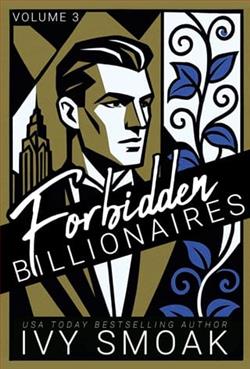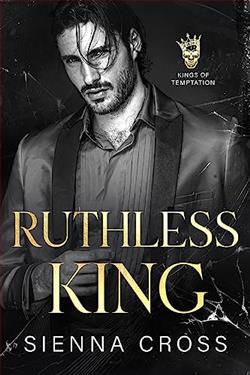Page 76 of Angel's Kiss
“I made mistakes there. I stole from and insulted too many British oligarchs. I found myself in a secret enclave of Ambarsar, fighting like a gladiator of old for the colonizers’ amusement. It was blood sport, but rarely did anyone die. They’d surrender first. It was there I met a man, Nehal. He was a seasoned fighter who defended himself with nothing but a length of rope. He used it like a lasso, strangling his larger and faster opponents until they beat the ground in submission. He beat me with it, and afterwards, I asked him to show me how it worked.”
“Why?” Christine asked, her mind filled with the image of Erik fighting like an animal in a pit for the amusement of the rich.
“I was curious to learn how something that so simple could be so lethal. I have a certain affection for that which more than what it seems,” Erik replied. “And soon enough I had a chance. There was a British officer who came often, and he had a large hand in keeping us all there, like slaves. He didn’t like the old man with the lasso winning over and over, so he went into the ring with him and shot him in cold blood. So I took up the lasso and I used it on Nehal’s murderer. It started a riot, that man’s death. In the chaos, we all escaped. I was free. And I took the lasso with me.”
“You still have it, don’t you?”
“It has defended me for many years, but it did not take another life for a long while after I left India. I traveled through China, all the way to Hong Kong, where once again I found the British seizing a land that was not theirs. So I stowed away on one of their ships and drank their ale on the sea journey back to London, around the horn of Africa. By the end of the voyage, the sailors were convinced the ship was haunted and I quite enjoyed being a ghost.
“I had spent so long wandering that I wanted nothing more than a place to belong, a place to call home. I hoped I might find it in my mother’s homeland, or perhaps meet someone of my own blood I did not hate. So from London I traveled England, and then went to Ireland for a year. But everyone with my mother’s name had left their village long ago for America. And so I returned at last to the land of my birth for the first time, wondering if it was possible to go home.”
“And you came to Paris, and found a home among the communards,” Christine continued for him. “I understand better now, why you joined them fighting for a new order.”
“My life had been filled with pain, thanks to the greed and cruelty of men in power. I wanted to destroy them, and I thought I had found compatriots of the same spirit and that we were making a better world. Until they began to do more to their prisoners than hold them captive. And I helped.”
For the first time, it was Erik who shuddered at the memory. What could be so dark that even he was repulsed by it?
“I knew pain and torture so well by then, from what Steiner taught me. It was easy to let my imagination do its worst. Especially when I told myself it was righteous.” Erik shook his head. “The communards grew as cruel as they were incompetent, and I tried to get away from what we had begun. They had other bases of operation besides the Opera, less fortified. And like any soldiers’ camp, there were women willing to sell themselves nearby, hoping for enough coin to survive the siege. And I indulged with one woman who was there.”
“Do you remember her name?” Christine was surprised at how much she resented a whore from a decade before.
“Mireille. Such a pretty name,” Erik replied wistfully. “It was at the end of things when I fucked her. It was empty. But a week later, the siege was broken, and the commune fell. I went back to our base, and I found so many dead. She was among them. They’d hung her.”
Immediately Christine burned with guilt for her jealousy. “That wasn’t your fault either.”
“I never felt anything for them, the women before you,” Erik murmured, touching Christine’s face in the dark. “You should know that.”
“You said there were three,” Christine asked, bracing herself. “Three lovers. What of the third?”
Erik sighed, his eyes downcast in the shadow and Christine could sense his pain and regret in the air. “The third I met in Persia. And yes, I did love him, for a little while.”
“Him?” Christine echoed, more curious than shocked. In a way, it made sense. Why would Erik care at all for who he touched or loved if given the chance? “It wasn’t your Daroga, was it?”
“No,” Erik replied with a shadow of amusement in his voice. “It was his brother. Shaya was the one that the Shah sent to obtain me. I had found my way to the great fair in Nizhny Novgorod, and my reputation had spread along caravan routes all the way to the court of Naser al-Din Shah Qajar of Persia. The Shah was eager for the most rare and unique amusements. I said no at first. I didn’t want to serve at the whim of a bored royal, no matter their country or creed.
“But Shaya was convincing, speaking with such love of his land and how the Shah wanted to bring it into the modern, continental world and show Britain and France and the Ottomans that Persia was still as great as it had been in the time of Darius or Xerxes. And he said the Shah was building a new palace, a place of dreams that I could consult on. So I went, thinking I could find my place and be more than a carnival freak or a failed rebel. I could be a builder there, a man of influence even. I should have listened to my instincts.”
Christine shivered at the words and the threat in Erik’s tone.
“I amused the Shah with my skills and he even laughed at the horrors of my face. He liked horrors. The women of his harem – the ones he kept locked in their own secluded world, barely able to see the sky – liked to hear me sing outside their windows. Shaya was assigned to spy on me in his role as one of the Shah’s secret police. I didn’t mind; I liked to dine with him and his brother, who was one of the Shah’s chief builders. His name was Ramin.”
Christine closed her eyes at the sound of regret in Erik’s voice.
“I had been there a few months when the Shah began to become bored with me, and I with him, honestly. It was only Ramin that kept me there. I had found a friend whose curiosity and intellect were close to my own. To him I confessed many of my misadventures of the years before, of Punjab and the Commune. He in turn took to consulting me about his designs for the new pleasure palace on the sea, at the Shah’s resort of Mazenderan. We were there, at the old palace, when the Shah decided on a new game for his pet monster. Shaya had told him, you see, the stories I had relayed to Ramin. And the Shah wanted to see how a man could be killed with just one length of catgut. I said no at first. I did not want to be that monster. Ramin tried to stop it.”
“But,” Christine provided for him, looking up. She could see Erik better now, as if her eyes were adjusting to the dark.
“But he put me in a courtyard. I can still see it, with its perfect arches inlaid with the names of Allah. The Shah was on a balcony above with courtiers at his side, including Shaya, who was some sort of distant noble cousin. But facing me on the ground was one of the men Shaya had helped arrest while doing the main function of his work – finding dissidents against the Shah. The man was a traitor condemned to die, but he was armed. Whichever of us made it out of that courtyard would be allowed to live.”
“And you killed him,” Christine whispered.
“Since my mother tried to expel me from her womb, I have always been stubborn against death. I don’t know why, really, but I have always fought to live, no matter what. And so I would not let death take me there. When I strangled that man with my Punjab Lasso, the court applauded as if it was a new magic trick. I was glad Ramin wasn’t there to see.”
“But it didn’t stop there, did it?”
“I became the monster I had always been told I was. My will was law, and everyone feared me. Everyone except the Shah, Shaya, and Ramin. The Shah was a cruel, paranoid man. He had been a reformer in his youth, inviting Europe to dine at his table while they colonized the rest of Africa and the East, but they had no respect for him and exploited his country. So, he grew petty and small-minded.
“By the time I came to his court, Naser al-Din had become the weakest kind of ruler – who only cared about maintaining his power and authority, no matter how his people suffered. I came to Persia in the midst of a terrible famine. Thousands starved throughout the country, but the Shah did not care. He continued to fill his court with gaudy spectacle and build his palace, while unrest grew and dissidents plotted against him. Shaya tracked them down. I gave them death.















